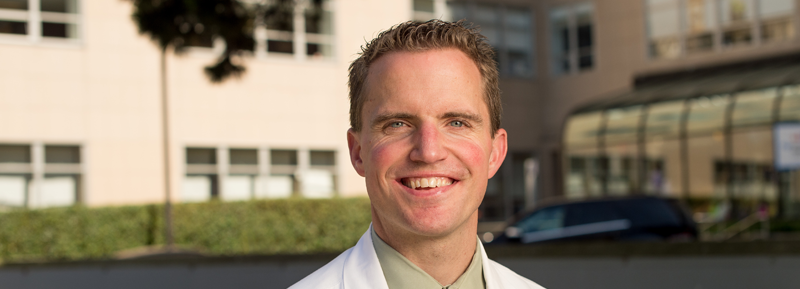Master Clinician: Bradley Sharpe, MD
The Power of Teaching
 "It's an honor to have a window into a person's life when they're at their most vulnerable," says Bradley Sharpe, MD. As associate chief of the Division of Hospital Medicine, he helps oversee care of about 100 hospitalized patients a day at UCSF Medical Center. "The intensity of the interaction with patients is profound," he says. "I try to make a connection and help them feel at ease."
"It's an honor to have a window into a person's life when they're at their most vulnerable," says Bradley Sharpe, MD. As associate chief of the Division of Hospital Medicine, he helps oversee care of about 100 hospitalized patients a day at UCSF Medical Center. "The intensity of the interaction with patients is profound," he says. "I try to make a connection and help them feel at ease."
He builds rapport by sitting down to talk with patients and families, using their words and language when possible. "If a patient says, 'I'm having heart trouble,' I say, 'Let's talk about your heart trouble,' rather than 'You have congestive heart failure,'" says Sharpe. "Also, studies have shown that clinicians often talk way too much. I try to elicit patients' goals and what they're worried about, and get them to do most of the talking."
Sharpe is passionate about medical education. He serves as associate program director for the UCSF Internal Medicine Residency Program, and teaches faculty in different departments to be more effective teachers. "People may know everything about a disease, but how do you teach so it changes the way trainees take care of patients?" he asks. Sharpe strives to establish a positive learning climate and provide specific feedback to learners. "Instead of saying, 'Great job with that patient,' I'll say, 'You clearly explained the plan without medical jargon – that was great,'" he says. "Rather than saying, 'You were rude to that patient,' I'll say, 'You got up to leave while the patient was still talking,' which focuses on specific behaviors."
Sharpe loves teaching about his "favorite disease," community-acquired pneumonia. "I like the physical exam, the evidence base, and knowing that patients usually get better," he says. Sharpe also coaches trainees on improving oral case presentations – in which they outline a patient's history, physical exam, lab results and their own clinical reasoning – encouraging them to focus on what listeners need to hear and to practice presentations out loud. On a national level, Sharpe helps organize the Academic Hospitalist Academy, a boot camp course for junior academic hospitalists. He is also a board member of the Society of Hospital Medicine, the national organization for hospitalists.
"Brad is among the very best clinical teachers in our department," says Robert M. Wachter, MD, chief of the Division of Hospital Medicine and Lynne and Marc Benioff Endowed Chair in Hospital Medicine. "He is also the kind of person that anyone would love to have as his or her doctor – whether the problem required 'Dr. House'-like brilliance or just sitting at the bedside of a dying patient, quietly listening."
"My proudest moments are when I see someone teaching what I taught them," says Sharpe. "If I teach 10 residents the appropriate antibiotics for pneumonia, and then each of them teaches eight interns, that's the exponential power of teaching." He is married to Margaret Fang, MD, MPH, also a UCSF hospitalist. Together they have two young daughters, Alexandra and Ariadne.